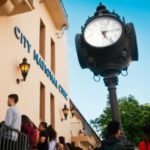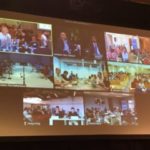
I had the pleasure of attending the Chautauqua Institution for the first time this past July, where I experienced the place — a beautiful, historic village on the shores of the Chautauqua Lake in southwestern New York — and the program, a blend of fine and performing arts, intellectual discussions, interfaith services, and recreational activities.
The combined setting and the culture create a one-of-a-kind inspirational experience. “Our lecture platforms, special studies for youth and adults, and literary arts author chats and workshops,” said Sherra Babcock, vice president, Emily and Richard Smucker Chair for Education at Chautauqua, “provide an opportunity to explore the best in human values and the enrichment of life. Since Chautauqua’s unique setting and community inspire interaction and collaboration among learners, doers, and teachers, learners of all ages can develop their own creative responses to the issues and the artistic opportunities of our times.”
While Chautauqua is an immersive experience, the institution looks outside itself to consider our world community. Chautauqua is best known for its nine-week summer season, filled with a variety of programming around four pillars: education, religion, the arts, and recreation.
Each week focuses on a different topic, and the program topics are developed based on previous participant evaluations, recommendations, by studying what is critical in society, and by keeping an ear to the ground. Themes explored during the 2013 summer season included:
Our Elegant Universe — The wonders of the cosmos, an understanding of space and time, and the most basic questions of existence.
The Greatest Generation — The values, work, and stories of the young and socially aware.
America, 1863 — The Civil War’s legacy in the context of a most pivotal year in U.S. history.
Markets, Morals, and the Social Contract — The role of markets in all spheres of American life.
The Pursuit of Happiness — What is happiness, and why is it one of our inalienable rights to pursue it?
Crime and Punishment — The U.S. criminal justice system, including what does and does not work.
Diplomacy — International affairs and the importance and practice of diplomacy.
Turkey: Model for the Middle East — Its history, culture, internal, and external politics.
Health Care: Reform and Innovation — The state and future of health care in the United States.
Speakers during the “Pursuit of Happiness”-themed week included Supreme Court Justice Anthony Kennedy; Robert Putnam, professor of public policy at Harvard University; Charles Murray, W.H. Brady Scholar at the American Enterprise Institute; and authors, as well as spiritual and intellectual thought leaders.
In the evening, entertainment options included theater, music, and comedy performances as well as poetry reading.

A Contextual View
Chautauqua Institution straddles the past and the present. It is “reflective” of Chautauqua’s history “in much of the architecture and many of its rituals,” Chautauqua Institution President Tom Becker said in one of his speeches during the week I attended, yet it responds “to a modern need.” That need is “for access to meaning; to affix the flood of information in our lives into a context and to consider the ongoing necessity of sparking an imaginative understanding of our proper place in the world around us,” he said. “The stimuli to imagination invoke the intellectual, creative, and spiritual aspects of life. You’ll find dynamic expression across generations, disciplines, and ideologies. There is an experience of community here that has value beyond the immediacy of the experience into the conduct of the rest of your life.”
When it comes to marketing Chautauqua as a destination, the institution is integral to its brand, said R. Andrew Nixon, executive director of the Chautauqua County Visitors Bureau. Chautauqua offers a “Victorian-village-like” setting and “serene and beautiful” lakefront environment with three miles of waterfront and two golf courses, Nixon said. Its identity is strongly tied to the institution, whose “brand is lifelong learning, offering the weeklong programs and over 400 additional courses, from learning to speak Chinese to taking a sailing course.”
When the institution is not in session, the property is available for group rental. Recent events included the four-day Jazz at Chautauqua festival, the Quilting Around Chautauqua quilt show (held each September), and “Jack Link’s Major League Fishing” TV show.
In addition to the programming on the nine themes and spiritual discussions encompassing all faiths or lack thereof, many other courses are available during the nine summer weeks, and extracurricular courses range from art, business and finance, technology, sailing, golf, health and fitness, writing and literature, foreign languages, music, philosophy, cooking, and music.
The lecture themes for next year’s summer program have been published — come August 2014, I’ll be attending Chautauqua’s Global Public Square led by CNN’s Fareed Zakaria. I’ve already signed up, and I’m counting down the months.
What Meeting Organizers Can Learn From Chautauqua
The uniqueness of Chautauqua is best appreciated by experiencing it firsthand. However, there is much that meeting professionals can learn from its practices. Perhaps the standout aspect of Chautauqua is that it engages participants on many levels. The opportunities for personal and professional growth and enjoyment are almost endless.
The tranquil environment at Chautauqua Institution is quite unlike the typical frenetic pace of many conferences. Many of the sessions are held in outdoor venues such as the Hall of Philosophy, surrounded by lush, green foliage. Attire is casual rather than business, and there is a lack of emphasis on food and adult beverages. There are food outlets on property and a farmer’s market available daily for purchasing fresh fruits, vegetables, and homemade fare. Many of the attendees also prepare meals in their guest houses or carry-out meals and dine by the lake or at many quiet areas throughout the property.
Other aspects of the Chautauqua experience for meeting organizers to consider include:
- A respect for history and a concerted effort to record and learn from it.
- Making good use of leisure time.
- Lifelong learning as a value.
- The art of storytelling as part of the presentations.
- An atmosphere of tranquility and respect for silence so people can hear each other and think.
- The connection between lifelong learning and the world condition.
- Providing an opportunity to learn brand- new ideas and put them in perspective.
- An in-depth examination of diverse ideas.
- The importance of gathering highly diverse learners with different backgrounds together to generate new ideas to bring back to their communities.
- Community-building is embedded in the culture and environment.
- The focus is on seeking common ground.
- The value of learning something that you know absolutely nothing about permeates the culture.
- Each side of an argument is presented separately for the learner’s consideration rather than debating an issue. All viewpoints are welcomed and heard — there is not much total agreement on anything, and that is accepted.
- The focus is on deep dives and broad expansion of ideas rather than on quick tips.
- Many of the speakers remain on the grounds for the week to meet with and discuss ideas. For example, next season, historian and storyteller Ken Burns will work on the planning of the theme and moderate an entire week’s sessions, thereby tying the ideas together.
- People come as seekers. They aren’t attending to be inculcated with knowledge, but rather to seek wisdom, enlightenment, and truth. It is a deeper experience than most.
- People are prepared to be participants rather than passive observers.
- Openness and acceptance are core values. Attendees feel free to be themselves.



